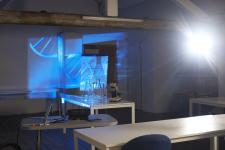Inside the garage labs of DIY gene hackers, whose hobby may terrify you
By Kristen V. Brown,
Fusion
| 03. 29. 2016
Untitled Document
When the future of genetic engineering arrived on Sebastian Cocioba’s doorstep, it was affixed to the back of a postcard from Austria with a little bit of packing tape.
Cocioba is a 25-year-old college dropout whose primary interest is tinkering with plant genetics in a lab he cobbled together from eBay. The lab is located in the spare bedroom of his parent’s lavish apartment in Long Island City, across the river from Manhattan. A few months ago, an internet friend from an online bio-hacking forum had sent him the lab’s latest addition: attached to that postcard was Crispr-Cas9.
Deposited onto a flimsy fragment of filter paper and wrapped in plastic, it looked like a tab of acid. But inside that crude packaging was the key to an incredibly precise DNA-editing technology that will revolutionize the world.
Crispr—a memorable acronym for the mouthful, “clustered regularly-interspaced short palindromic repeats”—gives scientists an unprecedented ability to decrypt and reorder genes, opening up a dazzling and terrifying universe of possibilities. This year, a top national security official called gene-editing a weapon of mass...
Related Articles
By Steve Rose, The Guardian | 01.28.2026
Ed Zitron, EZPR.com; Experience Summit stage;
Web Summit 2024 via Wikipedia Commons licensed under CC by 2.0
If some time in an entirely possible future they come to make a movie about “how the AI bubble burst”, Ed Zitron will...
By Arthur Lazarus, MedPage Today | 01.23.2026
A growing body of contemporary research and reporting exposes how old ideas can find new life when repurposed within modern systems of medicine, technology, and public policy. Over the last decade, several trends have converged:
- The rise of polygenic scoring...
By Daphne O. Martschenko and Julia E. H. Brown, Hastings Bioethics Forum | 01.14.2026
There is growing concern that falling fertility rates will lead to economic and demographic catastrophe. The social and political movement known as pronatalism looks to combat depopulation by encouraging people to have as many children as possible. But not just...
By Josie Ensor, The Times | 12.09.2025
A fertility start-up that promises to screen embryos to give would-be parents their “best baby” has come under fire for a “misuse of science”.
Nucleus Genomics describes its mission as “IVF for genetic optimisation”, offering advanced embryo testing that allows...




